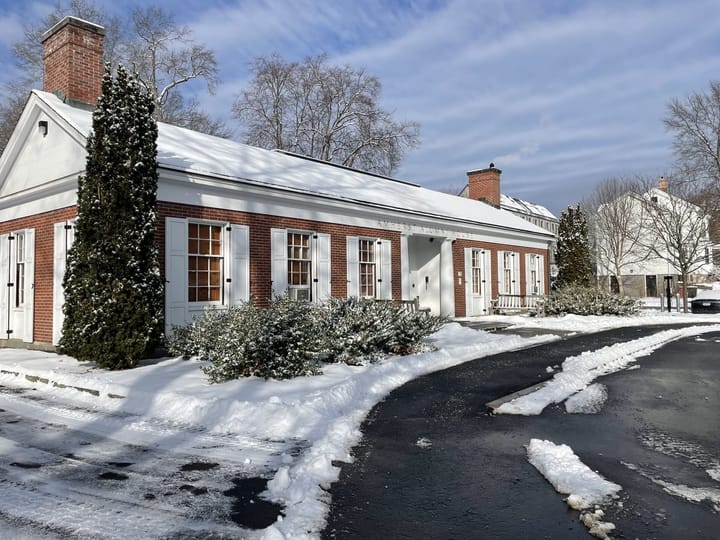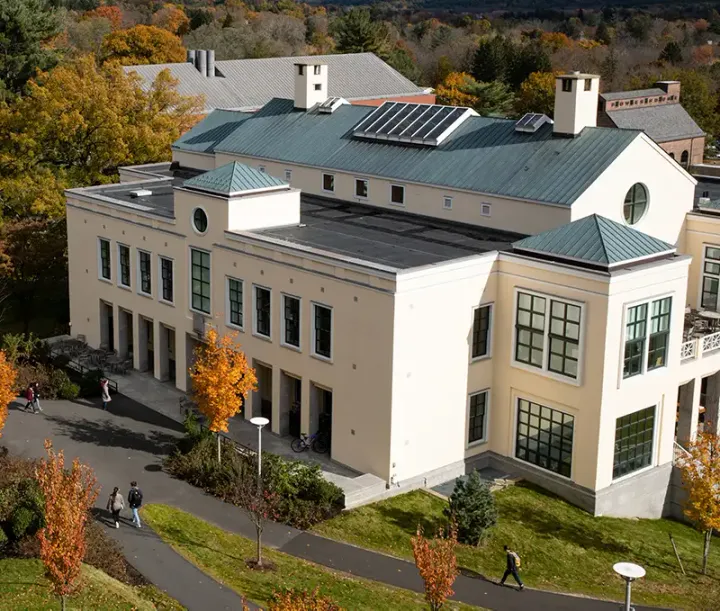President Elliott Looks Ahead to the College in the Trump Era
The results of the 2024 election are predicted to have a substantial impact on college campuses. The Student spoke with President Michael Elliott about the possible consequences of President-elect Donald Trump’s second term and how the college is preparing to respond.
In the wake of the 2024 presidential election, many colleges and universities are planning for potential policy changes from the incoming Trump administration. Though the future is unclear, Trump has made many comments criticizing institutions of higher education and has mentioned the possibility of easing for-profit college regulations, raising university endowment taxes, and even eliminating the Department of Education.
The Student spoke with President Michael Elliott about how Amherst College is preparing for Trump’s second term. In the interview, Elliott expressed concerns over how the proposed endowment tax increase would impact the college, especially concerning financial aid. He also outlined plans the college is making to preserve academic freedom, as well as to protect international and transgender students, faculty, and staff.
Endowment Taxes and Financial Aid
One of the biggest concerns for the college is higher endowment taxes. Since Amherst’s endowment supports over half of its operating costs, a tax increase on the endowment could have a substantial impact on campus life.
Currently, Amherst and similar institutions have a 1.4% endowment tax. Elliott said that the college pays “about one million, two million dollars a year,” and that if that amount increased twofold, the college could manage “in ways that most students, faculty, and staff would not notice. That’s less than [the] budget cuts we did.”
However, if Amherst had to pay 20 or 30 million dollars, which certain proposals — including a bill introduced by Vice President-elect JD Vance — have advocated for, Amherst would have to make more noticeable cuts. Last year, the college spent $77.6 million on financial aid and used $155.6 million from the endowment for operations. Elliott said that since tax increases are still speculative, the Board of Trustees and administration have not made concrete plans regarding where cuts would come from, but he said that financial aid would likely be impacted.

“I want to be very clear. I’m not saying that it necessarily would be [affected],” Elliott said. “But [financial aid is] certainly an area where a large increase in endowment tax might force us to examine the degree to which we aggressively recruit low-income students and other ways that we support students on financial aid.”
Elliott said that if tax increases were “large enough,” the college’s need-blind admissions policy may end. He did not specify what tax increases would warrant this. Such a change would have dramatic impacts on the demographic makeup of the college — both socioeconomically and racially — which has already had a decrease in racial diversity after the end of affirmative action.
The college expects endowment taxes to be part of broader tax legislation that Congress will enact next year. While waiting for potential tax changes, Amherst is collaborating with other colleges, especially other small liberal arts schools, to figure out how to navigate endowment tax increases and to lobby Congress against enacting such policy.
Academic Freedom
Many professors have worried about how academic freedom may be curtailed by a Republican trifecta in the federal government.
Elliott emphasized that the college will protect faculty’s academic freedom in their teaching and research. “Academic freedom is a sacrosanct principle,” he said.
He said that Amherst administrators were “worried” that an increased endowment tax or the college accreditation process may be used to intimidate the college into reducing faculty’s freedom. Trump has described college accreditation as the “secret weapon” to eliminating “the radical left” from higher education. Currently, there are 63 recognized accreditors that are private, nongovernmental organizations. Changing who is accredited and making it a state process have been floated as potential shifts in how accreditation would work, potentially making the process more politicized.
Elliott said Amherst “was very fortunate” to be in Massachusetts since the state has “shown very little appetite for constraining institutions in higher education around what we teach, how we teach.” As a result, he did not anticipate that accreditation would be used to reduce academic freedom.
Elliott did say that Amherst would accept higher endowment taxes if it meant that professors’ academic freedom would be unfettered: “We would be willing to make sacrifices.”
International Students
With Trump’s history of anti-immigration rhetoric and policy, including proposed increased deportations and decreases in the number of new visas issued, international students, faculty, and staff are concerned for their security and the status of their visas. The college has policies in place to protect them already, and is planning to create more.
In 2016, when Trump was first elected, the college created “a series of commitments” to protect international students, faculty, and staff. These included creating “very strict” data privacy practices so that immigration and citizenship status was stored in limited data systems and as few people as possible had access to this information.
Amherst College has also “made clear” to the Town of Amherst Police Department and the Amherst College Police Department that officers should not voluntarily offer such information to federal legal authorities.
“It would require a federal subpoena for them to receive that information,” Elliott said.
Elliott said that in the past six months, the college has been reviewing policies already in place to ensure “what we’re doing conforms with our ideals.”
Since the 2024 election, the college has worked to have more support for international students. The college will offer legal assistance to all international students through immigration lawyer Dan Berger, who will be on campus this week. Elliott confirmed any visa holder will be allowed to stay on campus over winter break, though the college had initially said the opposite. The college also recommended that all international students come back to the U.S. before Trump’s inauguration on Jan. 20.
Elliott did not know how Trump’s immigration policies could impact international students’ admission process to Amherst. He said that there was no substantial shift in admissions during Trump’s first term, but noted that things “could be very different this time around.”
“It depends on what the actual policy changes are,” Elliott said.
Transgender Protections
Transgender people are also at risk under Trump’s presidency. While President Joe Biden’s administration required schools to interpret Title IX so that it protected against all sex and gender discrimination, including discrimination against transgender students, it is likely that the Trump administration will reverse this decision.
Elliott was clear that changes to Title IX’s scope would not change Amherst’s approach to discrimination.
“Title IX for us at Amherst is a floor of the kinds of protections that we want to provide our students. It’s what’s federally mandated, but it is not the ceiling of what we provide in terms of protection for students,” Elliott said. “So we can [and] will continue to protect and investigate harassment against students based on expression of gender identity, sexuality or transgender student status, even if it’s not required.”
Elliott also said that data privacy policies that are in place for immigration and citizenship status are also in place for gender identity information. He noted that, though the college asks students for their gender identity in their student records, because of the Family Educational Rights and Privacy Act (FERPA), students can choose to limit what personal information is available in the student directory.
Racial Diversity in the Student Body
Elliott said that he did not “know how [the government] could make it much harder than [it has] already” to have a racially diverse student body after the Supreme Court found that affirmative action was unconstitutional in 2023. Since then, Amherst has seen a dramatic decrease in racial diversity in the class of 2028, with only 3% of students identifying as Black.
However, Trump has plans to further target institutions that actively promote racial diversity. He said that he wants the Department of Justice to file civil rights cases against colleges and universities that have diversity, equity, and inclusion practices or that have allowed pro-Palestinian protests.
Elliott said Amherst was not concerned about the Trump administration being “more aggressive” in investigating colleges because “we are fully conforming with the law.”
Though Elliott thinks it is unlikely that a new Trump administration will make it harder than it currently is to admit a racially diverse class, he echoed past comments that the college is “ramping up the ways that we recruit and yield students in ways that we think will lead to an increase in racial diversity.” Elliott hoped that these efforts would yield a more racially diverse class of 2029.
Abortion and Reproductive Justice
Though he has made contradictory statements regarding his stances on abortion, Trump said during his Sept. 10 debate with Vice President Kamala Harris that he would not sign a bill that would create a national ban on abortion (he avoided saying if he would veto such a bill). However, Republicans will still likely work to further limit access to abortion care and other reproductive resources during the next four years. A Trump-run FDA could rescind federal rules that made the abortion pill mifepristone easier to access.
Elliott said the college offers students, faculty, and staff “access to the full range of reproductive healthcare” and that it has successfully done so even after the 2022 Dobbs v. Jackson Women’s Health Organization decision which determined there was not a constitutional right to abortion. He said that Amherst “is very fortunate” to be located in Massachusetts, where reproductive rights are protected by state law.
Elliott also said that being based in Massachusetts also means that regardless of where their insurance providers are based, students have access to reproductive healthcare. “Obviously we can’t make an insurance provider provide a service,” he explained. “But that has not been an issue for us so far.”
Elliott did not anticipate there would be any new policies that would cause any major changes to Amherst’s approach to reproductive healthcare, but said, “We’ll continue to watch.”
Message to the Amherst Community
Elliott wanted the Amherst community to be compassionate to each other and to remember that this is not the first time that the college has experienced “anxiety and uncertainty.”
He also said that students may hear rumors about the administration’s actions and policies, and urged students to “make sure they’re dealing with the real information.”
“Moments of anxiety are also moments when misinformation starts to circulate,” Elliott said. “We will try to do our best in the administration to hear what the questions are for the students, hear what the concerns are, and get that information as quickly as possible.”





Comments ()